 MyDogBreeds
MyDogBreeds English Foxhound is originated from United Kingdom but Beagle-Harrier is originated from France. English Foxhound may grow 14 cm / 6 inches higher than Beagle-Harrier. English Foxhound may weigh 7 kg / 16 pounds more than Beagle-Harrier. Both English Foxhound and Beagle-Harrier has almost same life span. English Foxhound may have less litter size than Beagle-Harrier. English Foxhound requires Low maintenance. But Beagle-Harrier requires Moderate maintenance
English Foxhound is originated from United Kingdom but Beagle-Harrier is originated from France. English Foxhound may grow 14 cm / 6 inches higher than Beagle-Harrier. English Foxhound may weigh 7 kg / 16 pounds more than Beagle-Harrier. Both English Foxhound and Beagle-Harrier has almost same life span. English Foxhound may have less litter size than Beagle-Harrier. English Foxhound requires Low maintenance. But Beagle-Harrier requires Moderate maintenance
 The English Foxhound was found in Great Britain as far back as the late 1700’s. They were bred to be scent hounds and hunt the fox by following his smell. It was a crossing of several different types of hounds that produced the English Foxhound. This included the Greyhound, the Bulldog and the Fox Terrier. It was perceived that there were not a lot of deer left in the United Kingdom to be hunted for both sport and food. So, a new dog would be needed instead for the Staghound and Deerhound.
The English Foxhound was found in Great Britain as far back as the late 1700’s. They were bred to be scent hounds and hunt the fox by following his smell. It was a crossing of several different types of hounds that produced the English Foxhound. This included the Greyhound, the Bulldog and the Fox Terrier. It was perceived that there were not a lot of deer left in the United Kingdom to be hunted for both sport and food. So, a new dog would be needed instead for the Staghound and Deerhound.
The Foxhound was developed as a pack animal bred to chase the fox followed by hunters on horses. The Foxhound was bred with incredible stamina, a great ability to follow scents, track prey, and act as a watchdog as well. This breed are pack animals. They hunt in packs and prefer to live in packs. A solitary English Foxhound is probably not a happy Foxhound. The English Foxhound is stockier and slower than his cousin the American Foxhound. The English Foxhound is recognized by the AKC and UKC. In 2012 the International Foxhound Association was developed to promote the English Foxhound.
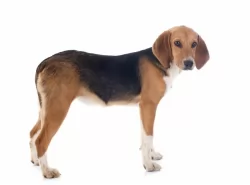 The Beagle Harrier, the breed that was made mixing the France Scent Hounds and a Beagle.
It is not quite sure if this breed was made on purpose or the mix of the breeds happened and resulted in a great dog so the breeding continued.
Since they are not large dogs as hounds, they are used to hunt small animals.
The Beagle Harrier, the breed that was made mixing the France Scent Hounds and a Beagle.
It is not quite sure if this breed was made on purpose or the mix of the breeds happened and resulted in a great dog so the breeding continued.
Since they are not large dogs as hounds, they are used to hunt small animals.
This first breeding took place in England, but after the 14th century, they were breed on purpose in France.
 The English Foxhound is a superb athlete who can run for hours without a break. He has muscular, sturdy and straight legs with round paws. His chest is deep, and his back is level. Their head is wide, and the muzzle is long with 16 inches in the front of the ears. The nose is long, and those ears are set low. They can be many colors as long as it is a “hound” color of tan, tricolor, black and white, or red.
The English Foxhound is a superb athlete who can run for hours without a break. He has muscular, sturdy and straight legs with round paws. His chest is deep, and his back is level. Their head is wide, and the muzzle is long with 16 inches in the front of the ears. The nose is long, and those ears are set low. They can be many colors as long as it is a “hound” color of tan, tricolor, black and white, or red.
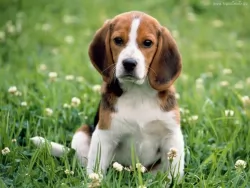 The Beagle Harrier is a scent hound that is described as a big sized Beagle or a small sized Harrier. This breed was developed from this two breeds, actually. Despite the looks of these breeds, the Beagle Harrier is an energetic kind of dog who gets very attached to his family. This medium sized pet comes in variations of colours and they are usually tricoloured. They usually have dark coloured eyes, white paws, and They usually grow up to have a very muscular body, but, if you don’t provide them with the daily activity they need, they will quickly get obese and unhappy.
The Beagle Harrier is a scent hound that is described as a big sized Beagle or a small sized Harrier. This breed was developed from this two breeds, actually. Despite the looks of these breeds, the Beagle Harrier is an energetic kind of dog who gets very attached to his family. This medium sized pet comes in variations of colours and they are usually tricoloured. They usually have dark coloured eyes, white paws, and They usually grow up to have a very muscular body, but, if you don’t provide them with the daily activity they need, they will quickly get obese and unhappy.
 The English Foxhound gets along with other dogs and like people. He was bred to be a pack animal, not a loner. He will get along with most any other animal and children as well. However, they are not often kept as pets because their prey drive and pursuit drive are so strong that nothing else matters. The chase is what life is all about for this breed. They are hardwired for it. They are not easy to train because they are constantly distracted by smells and movements that could send them off on the chase.
The English Foxhound gets along with other dogs and like people. He was bred to be a pack animal, not a loner. He will get along with most any other animal and children as well. However, they are not often kept as pets because their prey drive and pursuit drive are so strong that nothing else matters. The chase is what life is all about for this breed. They are hardwired for it. They are not easy to train because they are constantly distracted by smells and movements that could send them off on the chase.
Keep them on a lease when walking them so they don’t go wandering or running of. They love to run, and they love to talk – bay actually. They might slow down somewhere around 8-10 years old. They need a strong owner and a lot of exercise to be happy.
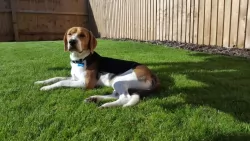 The Beagle Harrier, if trained properly and socialized while he was still a pup, will be the great playmate for any child. They get along with strangers, as well. We might say that they will get along with anybody who is ready to run and play with him. Children are most likely that kind of playdate, so it appears that they like children more. The Beagle Harrier is a great family pet, and he is great with babies, toddlers, teenagers… so don’t be afraid to leave the dog alone during the playdate!
The Beagle Harrier, if trained properly and socialized while he was still a pup, will be the great playmate for any child. They get along with strangers, as well. We might say that they will get along with anybody who is ready to run and play with him. Children are most likely that kind of playdate, so it appears that they like children more. The Beagle Harrier is a great family pet, and he is great with babies, toddlers, teenagers… so don’t be afraid to leave the dog alone during the playdate!
hunting, scent tracking, search dog
Some will say that the Beagle Harrier is one of the most desirable pets because of his loving and lively nature. They get along with almost anyone and they don’t mind living indoors if you have the time to take him out for a daily run each day. They will do great in a large group of people and any public places so you can take your Beagle Harrier with you anywhere you go.
Since the Beagle Harrier is placed in a group of the hound dogs, you must be aware that he will have the attitude of the pack leader. Once you got the Beagle Harrier puppy, you must start training and socializing him in order to grow the pet that will be easy to handle and accepted by the family and all the people around you, even strangers. They are very intelligent and they have a calm nature so they will be quite easy to train.
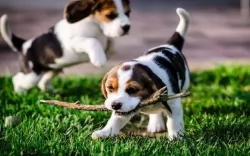 Overall a healthy and hearty breed, they are prone to hip dysplasia and renal disease.
Overall a healthy and hearty breed, they are prone to hip dysplasia and renal disease.
Degenerative and debilitating at worse. In mild forms cause lameness and arthritis.
Kidney disease – for some reason the kidneys cannot clear out toxins like urea and creatine
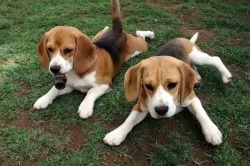 Almost every active dog suffers from joint diseases. Even though it’s generally a genetic disease, you can lower the chances of hip or elbow dysplasia by taking care of your dog’s weight, diet and daily exercise.
Almost every active dog suffers from joint diseases. Even though it’s generally a genetic disease, you can lower the chances of hip or elbow dysplasia by taking care of your dog’s weight, diet and daily exercise.
The Beagle Harrier has big ears that are always set down. That makes them ideal for the dirt accumulation, ear irritations and ear infections. Check his ears regularly and clean them at least once a week.
 The English Foxhound is a high energy dog that needs a high quality dog food. He should be fed about 2.5 -3 cups a day in two meals of dry food. Because he is a deep chested dog, beware of bloat and don’t feed large meals, particularly before or after strenuous exercise.
The English Foxhound is a high energy dog that needs a high quality dog food. He should be fed about 2.5 -3 cups a day in two meals of dry food. Because he is a deep chested dog, beware of bloat and don’t feed large meals, particularly before or after strenuous exercise.
Seizures are caused by epilepsy, but they can be treated, and the dog can have a quality life.
When the stomach becomes distended or twisted. Can result in death if not treated immediately.
The English Foxhound’s long, floppy ears are prone to infection and allergies. Inspect and clean them regularly.
The English Foxhound is an easygoing canine, but he has an incredible energy level and needs a lot of exercise every day. In fact, if you are not going to hunt then don’t get a Foxhound. It is not fair to the dog. Of course, if you have acres of land and are into agility, tracking, coursing and rally then this might be the dog for you. But if the English Foxhound does not get enough daily exercise, he will not be a good house pet. This dog was bred to run for miles. You cant keep him cooped up in your house.
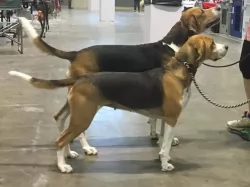 Since the Beagle Harrier is an active dog breed, they will need food for the active dogs. Make sure you provide them with quality food that will give them enough strength to get through the very active day, and not gain too much of the weight. It is very important that you don’t overfeed him because this breed quickly becomes obese. It is advisable to use treats while you train him to do new tricks, but be very careful with the amount you give to the dog.
Since the Beagle Harrier is an active dog breed, they will need food for the active dogs. Make sure you provide them with quality food that will give them enough strength to get through the very active day, and not gain too much of the weight. It is very important that you don’t overfeed him because this breed quickly becomes obese. It is advisable to use treats while you train him to do new tricks, but be very careful with the amount you give to the dog.
Puppies need to be fed only two times a day. Once you decide which brand of food you will use, stick with them until the dog is 6 months old. Make sure they have enough nutrients and the quality ingredients that will help them with growing strong and healthy bones.
If you want Beagle Harrier to grow up in a happy and healthy dog, make sure you provide him with quality food, lots of exercises and unconditional love. They are extremely loving and they get depressed if left alone. Grooming tips are very clear – they need a regular brush because shed a lot. The more you brush, the less hair you will find on your hands during the belly rubs.
If your Beagle Harrier is trained and socialized, the dog park will be the best daily activity for him. If there is no dog park near your house, take him to the bike ride, jogging, swimming, hiking, markets, parks… They love to be off the leash and with people but since they are the hound dogs, don’t be surprised if they get distracted by smelling something more interesting than the ball. They would love to grow up in a house with a large yard, but, if you live in the apartment, make sure that you take time for his daily activity.